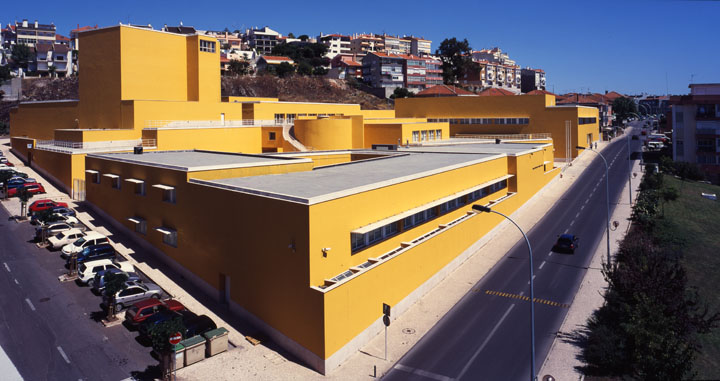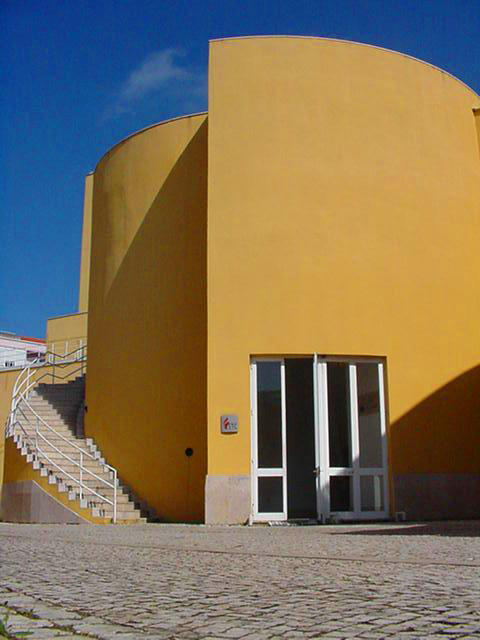The Lisbon Theatre and Film School (ESTC) was created in Lisbon, by means of a legal diploma that converted the centennial and prestigious National Conservatory into multiple establishments specialized in those same artistic subjects, which had, until then, been taught at the Conservatory. ESTC was then created and dedicated to the teaching of Theatre and Cinema.

National Conservatory Building | 1950/1951
The National Conservatory initially comprised the Music Conservatory, created by Casa Pia via an 1835 decree. With subsequent reforms, the name was altered to Royal Conservatory of Lisbon. Similarly, following the implantation of the Republic, the School of Drama / Declamation became the School for the Art of Acting just as the Royal Conservatory became the National Conservatory.
On May 19th, 1914, the School for the Art of Acting inaugurated a degree in scenography and theatrical decoration (which was taught at the great painting hall of the National Almeida Garrett Theatre and, since it was considered a dependant of the School for the Art of Acting, was exclusively dedicated to service and trades of the corresponding professor), as well as a degree in costuming for theatre practice (August 6th, 1994 decree).
This tradition was maintained and developed throughout subsequent reforms to the teaching of Theatre, and is still visible today in the degrees offered by the Theatre department at the Lisbon Film and Theatre School.
On the other hand, Cinema was only introduced to the National Conservatory in 1971, as part of a reform spearheaded by Madalena Perdigão, under the Minister for Education José Veiga Simão.
As such, the Pilot School for the Training of Cinema Professionals was created in 1973, and it established early on a desire to connect the teaching of the technical and practical knowledge of film-making to an artistic approach.
The degree offered nowadays by the Cinema Department of the Lisbon Film and Theatre School is the result of an evolution rooted in that very first degree, which was, in fact, pioneering in Portugal’s public higher education.
The Lisbon Film and Theatre School became a school of the Polytechnical Institute of Lisbon, having gone through a period of internal organisation overseen by a committee specifically created for the purpose, until the publication of its statutes in the Journal of Laws (Diário da República), 2nd series, nr. 15, of January 18th, 1995.
The decision to develop a building for ESTC from scratch in Amadora (greater metropolitan Lisbon area) – the first time a building was constructed in Portugal specifically for an Art’s higher education institution – finally allowed the transfer of activities, in 1998, from the historic but degraded Caetanos Convent in Lisbon, where Almeida Garrett had “temporarily” set up the General Conservatory for Dramatic Arts in 1836, to brand new modern facilities, equipped with appropriate classrooms, laboratories, screening rooms, stages and studios, among other features which elevate the teaching and working environment for the school’s community.
The bi-departmental structure of the school, resulting from the historical inheritance of the pre-existing schools of film and theatre in the National Conservatory, means that each Department is afforded internal pedagogic-scientific autonomy, established in its statutes. ESTC has established itself, nationally and internationally, as a reference in its fields, as part of important organizations in Theatre, as, for example, the IIT – International Institute of Theatre / UNESCO chair, as well as in Cinema, such as the CILET –International Connection Centre of Cinema and Television Schools. Furthermore, this interest in internationalization has led to the improvement of the school’s participation in international mobility programmes with foreign schools, both for students, professors, and other staff, such as Erasmus+, as well as bi-lateral programmes with Latin American universities (Brasil, Argentina, Mexico).
ESTC’s mission, as it is established in its statutes, consists in the pursuit of the following goals:
1. Training highly qualified professionals.
2. Academic research and investigation activities.
3. Artistic experimentation and production.
4. Participation and elaboration of long-term projects.
5. Serving the community.
In the pursuit of these goals, ESTC has adapted all its degrees to the Bologna Process. Therefore, it offers, in both departments, first and second cycle programmes (Bachelor’s degrees and Master’s degrees), and it has created a Research Centre, which works in partnership with an identical centre from the University of Algarve to develop projects, as well as participating in local education programmes, such as working towards the enrichment of Amadora’s public elementary school curricula, and annually producing and directing dozens of shows, plays and films by its students, exhibited for free to the community, within its facilities, as well as in community theatres, museums, screening rooms and other public spaces.




